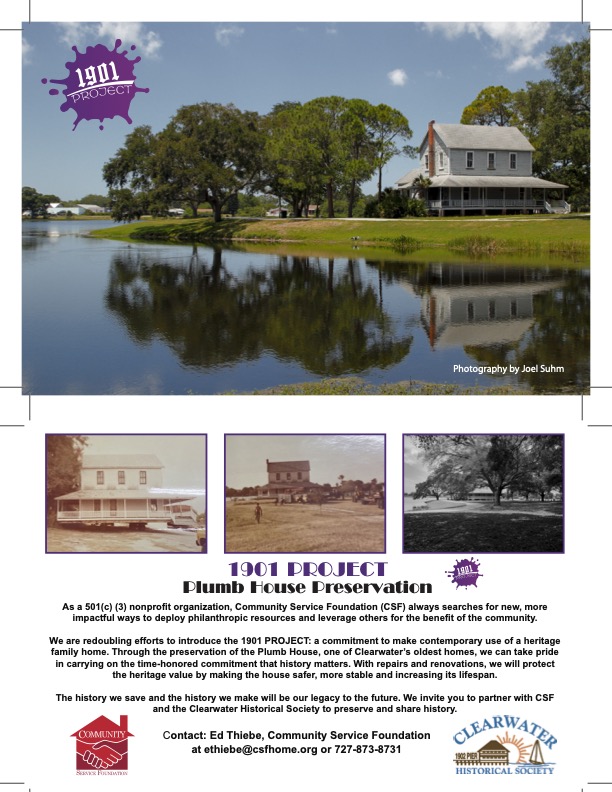
1901 PROJECT
Plumb House Preservation
At CSF we are redoubling efforts to introduce the 1901 PROJECT: a commitment to make contemporary use of a preserved heritage family home. Through the preservation of the Plumb House, one of Clearwater’s oldest homes, we can take pride in carrying on the time-honored commitment that history matters.
We owe it to future generations to be good stewards of the past. Much of our history resides within the buildings and landscapes of our communities. More specifically, family heritage homes are beloved landmarks that remind us of life long ago and help explain our world today. Through repair and alterations, we will protect the heritage value by making the house safer, more stable and increasing its lifespan.
The history we save and the history we make will be our legacy to the future.
To make contemporary use of a heritage family home means that CSF will seek to impact the community through use of the Plumb House to:
- Educate about the history of the house, Clearwater and the local community
- Serve as a resource center to promote the health and welfare of community residents, and
- Support art and cultural activities
Plumb House Fund
We are entrepreneurial in our search for diversified financial and other resources but always mindful that they support our vision and strategies rather than create them. Together with our partners and donors, we help transform communities through bold and proactive philanthropy.
By becoming a donor through a current or deferred gift, or an in-kind contribution to the Plumb House Fund, you will provide ongoing support for the 1901 PROJECT to benefit future generations. The Fund is designed to leverage its tax deduction status, and inspire people from all walks of life and all income levels to think beyond their lifespan when doing good works.
CSF takes pride in its oversight of resources that have been entrusted to us. In this process we apply measurable outcomes and professional standards, ensuring accountability in expenditures.
We conduct our work with cooperation and mutual respect; working collaboratively to take advantage of the diversity of skills throughout the organization and the greater community. Donors rely on us to build the networking and organizational capacity of the partnership; we rely on donors for resources.
Pinellas County citizens have a proud tradition of preserving and passing on their stories for the education and enrichment of future generations. We invite you to partner with the 1901 PROJECT to preserve and share history, and join a community doing good.
Legacy Program Definitions
Conservation:
All actions or processes that are aimed at safeguarding the character-defining elements of a cultural resource so as to retain its heritage value and extend its physical life. This may involve “Preservation,” “Rehabilitation,” “Restoration,” or a combination of these actions or processes.
Preservation:
The action or process of protecting, maintaining and/or stabilizing the existing materials, form and integrity of an historic place or of an individual component, while protecting its heritage value.
Restoration:
The action or process of accurately revealing, recovering or representing the state of a historic place or of an individual component, as it appeared at a particular period in its history, while protecting its heritage value.
Rehabilitation:
The action or process of making possible a continuing or compatible contemporary use of an historic place or of an individual component, through repair, alterations, and/or additions, while protecting its heritage value.
Heritage Value:
The historic, aesthetic, scientific, social/cultural, or spiritual value of a place to past, present, or future generations. The heritage value of a historic place is embodied in its character-defining materials, forms, location, spatial configurations, uses and cultural associations or meanings. They must be lasting and maintain ongoing appreciation, teach us about the past and the cultures that came before, help create community identity, and provide connections between the past, present, and future. Individual categories of heritage values are further defined as:
Aesthetic Values:
Refers to the sensory qualities of a historic place in the context of broader categories of design and tradition. A place may have aesthetic value because of its architectural style, materials, how it reflects a particular style or period of construction or craftsmanship.
Historic Values:
Refers to the association that a place has with past events and historic themes, as well as its historic place with important events, the age of a place, activities, people or traditions, its role in the development of a community, region, province, territory or nation, or its patterns of use.
Scientific Values:
Refers to the capacity of a historic place to provide knowledge, information and evidence that can advance our understanding and appreciation of a culture. Scientific value can derive from many factors such as age, quality, completeness, complexity or rarity.
Cultural/Social Values:
Considers the meanings attached to a place by a community in the present time and how people feel about a place. Cultural/Social value may be ascribed to places that perform a key role within communities, support community activities or traditions, or bring the community together and create a sense of shared identity or belonging.
Spiritual Values:
Ascribed to places with religious or spiritual meanings for a community, or a group of people.
Sacred and spiritual places could include places of mythological significance, landscape features associated with myth and legends, burial sites, fasting/vision quest sites, places representing belief systems or places associated with sacred traditions, ceremonial practices or rituals of a community or groups of people.
